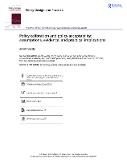| dc.contributor.author | Veselý, Arnošt | |
| dc.date.accessioned | 2024-06-19T08:15:35Z | |
| dc.date.available | 2024-06-19T08:15:35Z | |
| dc.date.issued | 2024 | |
| dc.identifier.uri | https://hdl.handle.net/20.500.14178/2509 | |
| dc.description.abstract | Policy calibration is often described as a technical phase of policymaking after the most important aspects of the proposed policy have already been decided. In this article, we show that policy calibration also has an important political dimension because the acceptability of policies depends often more on concrete aspects of policies than on general policy views. We argue that understanding policy acceptability, i.e. attitudes to proposed policies, requires understanding the link between general and specific policy attitudes. The article starts with an illustrative example, showing how acceptability might change when policy becomes calibrated. It is followed by a summary of five theoretical approaches to the link between general and specific policy attitudes. These theories are confronted with empirical evidence. This article demonstrates that although attitudes to general principles of policy design are often hard to change simply by providing individuals with new information, it is easier to increase (or decrease) the acceptability of specific policies in that manner. This paradox might be explained by the relatively loose link between individuals' attitudes to general policy principles and their attitudes to the specific use of policy tools. | en |
| dc.language.iso | en | |
| dc.relation.url | https://doi.org/10.1080/25741292.2024.2342098 | |
| dc.rights | Creative Commons Uveďte původ 4.0 International | cs |
| dc.rights | Creative Commons Attribution 4.0 International | en |
| dc.title | Policy calibration and policy acceptability: assumptions, evidence, and practical implications | en |
| dcterms.accessRights | openAccess | |
| dcterms.license | https://creativecommons.org/licenses/by/4.0/legalcode | |
| dc.date.updated | 2024-06-19T08:15:35Z | |
| dc.subject.keyword | Policy calibration | en |
| dc.subject.keyword | policy acceptability | en |
| dc.subject.keyword | policy attitudes | en |
| dc.subject.keyword | survey experiments | en |
| dc.subject.keyword | principle-policy gap | en |
| dc.subject.keyword | | en |
| dc.identifier.eissn | 2574-1292 | |
| dc.relation.fundingReference | info:eu-repo/grantAgreement/MSM//EH22_008/0004595 | |
| dc.date.embargoStartDate | 2024-06-19 | |
| dc.type.obd | 73 | |
| dc.type.version | info:eu-repo/semantics/publishedVersion | |
| dc.identifier.doi | 10.1080/25741292.2024.2342098 | |
| dc.identifier.utWos | 001206777200001 | |
| dc.identifier.eidScopus | 2-s2.0-85191163820 | |
| dc.identifier.obd | 648941 | |
| dc.subject.rivPrimary | 50000::50600::50602 | |
| dcterms.isPartOf.name | Policy Design and Practice | |
| dcterms.isPartOf.issn | 2574-1292 | |
| dcterms.isPartOf.journalYear | 2024 | |
| dcterms.isPartOf.journalVolume | 7 | |
| dcterms.isPartOf.journalIssue | 2 | |
| uk.faculty.primaryId | 118 | |
| uk.faculty.primaryName | Fakulta sociálních věd | cs |
| uk.faculty.primaryName | Faculty of Social Sciences | en |
| uk.department.primaryId | 346 | |
| uk.department.primaryName | Katedra veřejné a sociální politiky | cs |
| uk.department.primaryName | Department of Public and Social Policy | en |
| uk.department.secondaryId | 349 | |
| uk.department.secondaryName | Centrum pro sociální a ekonomické strategie | cs |
| uk.department.secondaryName | Centre for Social and Economic Strategies | en |
| dc.description.pageRange | 176-190 | |
| dc.type.obdHierarchyCs | ČLÁNEK V ČASOPISU::článek v časopisu::původní článek | cs |
| dc.type.obdHierarchyEn | JOURNAL ARTICLE::journal article::original article | en |
| dc.type.obdHierarchyCode | 73::152::206 | en |
| uk.displayTitle | Policy calibration and policy acceptability: assumptions, evidence, and practical implications | en |

